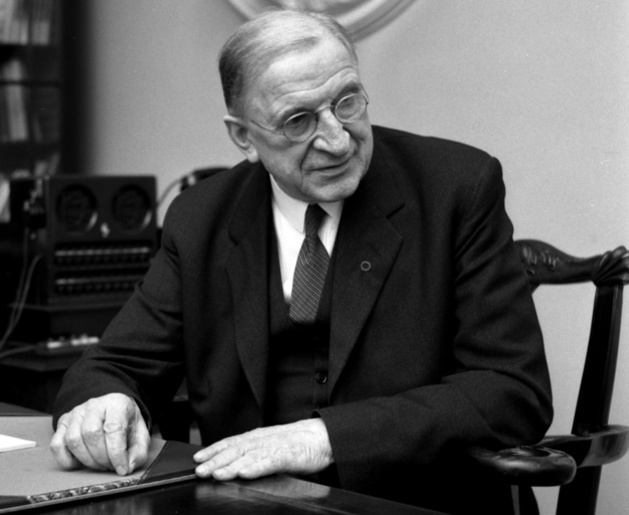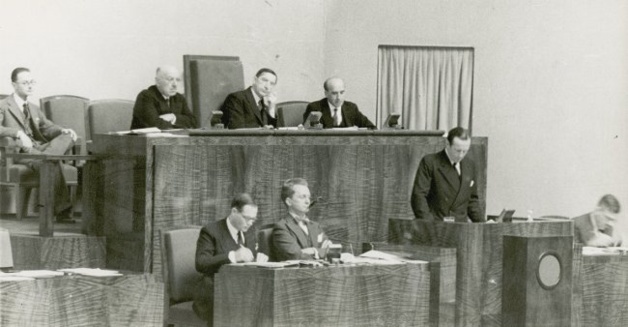
DR
It is on the eve of the First World War, in 1913, that Éamon de Valera made a political commitment. Although being the father of three children, he decided to engage in Óglaigh na hÉireann (Irish Volunteers). Volunteers were nationalists refusing to negotiate with the British who controlled Ireland, and were opposed to the conscription and in favor of a violent revolution in order to liberate Ireland. This revolution took place in 1916 and is known as the ‘Easter Rising’.
Éamon de Valera is part of the executive commandment of the rebellion. But given the failure of the revolt, poorly planned and unrealistic, de Valera surrendered with his battalion. Sentenced to death for terrorism, he was not executed perhaps due to his American citizenship but more likely because of the sentence which arrived too late, giving time to the opinion to plead for clemency for him.
Éamon de Valera is part of the executive commandment of the rebellion. But given the failure of the revolt, poorly planned and unrealistic, de Valera surrendered with his battalion. Sentenced to death for terrorism, he was not executed perhaps due to his American citizenship but more likely because of the sentence which arrived too late, giving time to the opinion to plead for clemency for him.
From terrorist to statesman
Only survivor of the head of the “Easter rising", de Valera was elected President of Sinn Féin (Irish Nationalist Party) in 1917. He then embarked for the United States in search of funding for his party. On his return, fronting a wave of violence between nationalists and the British (especially illustrated by the Bloody Sunday of 1920 during which the British Army fired on the crowd during a Gaelic football match in retaliation for the murder of 14 British agents) de Valera decided to negotiate a cease-fire with London. But refusing a partition of Ireland and without illusions about the success of the negotiations, he refused to go himself in England. So he sent a plenipotentiary delegation led by Michael Collins, Minister of Finance of his unofficial government.
The delegation, which included among its members Arthur Griffith, the founder of the Sinn Fein, was not supposed to make any decision on behalf of Ireland without consulting the Irish National Assembly (the Dáil). However, having to cope with a British ultimatum, the delegation yielded and signed a treaty recognizing the partition of Ireland. De Valera disclaimed the delegation and left office facing the Dáil vote in favor of the treaty.
This conflict between opponents and supporters of the Anglo-Irish treaty is now called the "Irish Civil War." It is during this fratricidal war, that Michael Collins, among others, died in an ambush in County Cork. But Valera discovered the Irish hostility towards his cause and decided to disarm in 1923. Three years later in 1926, he created his own political party, Fianna Fail, to continue his fight legally. After failing in 1927, he won the 1932 election becoming President of the Executive Council of Ireland. The same year, he became president of the Council of the League of Nations in Geneva.
The delegation, which included among its members Arthur Griffith, the founder of the Sinn Fein, was not supposed to make any decision on behalf of Ireland without consulting the Irish National Assembly (the Dáil). However, having to cope with a British ultimatum, the delegation yielded and signed a treaty recognizing the partition of Ireland. De Valera disclaimed the delegation and left office facing the Dáil vote in favor of the treaty.
This conflict between opponents and supporters of the Anglo-Irish treaty is now called the "Irish Civil War." It is during this fratricidal war, that Michael Collins, among others, died in an ambush in County Cork. But Valera discovered the Irish hostility towards his cause and decided to disarm in 1923. Three years later in 1926, he created his own political party, Fianna Fail, to continue his fight legally. After failing in 1927, he won the 1932 election becoming President of the Executive Council of Ireland. The same year, he became president of the Council of the League of Nations in Geneva.
From internationalism to isolationism
The taking power of Éamon de Valera in Ireland is marked by a move away toward the Anglo-Irish Treaty, in particular with the publication of the Irish Constitution in 1937 which proclaimed the sovereignty of Ireland, yet still part of the Commonwealth. At the same time de Valera promoted the dialogue within the League of Nations especially after being elected President of the Assembly of the League in 1938, while being critical of the institution1. On the eve of World War II, on the model of the United States, de Valera refused to engage in the conflict and declared the neutrality of Ireland.

But unlike the United States who finally engaged in the conflict following the attack of Pearl Harbor, de Valera maintained the Irish neutrality throughout the conflict. Indeed, he did not want to support Great Britain, the historical enemy of Ireland, nor to attack it, risking the newly acquired independence of his country. In addition, de Valera was aware that the Irish were not unanimous about which camps to take and he refused to take the risk to start a new civil war to decide with whom Ireland should engage in the Second World War. But after the war de Valera was blamed by foreign countries for the policy of independence of Ireland, in particular because it led him to offer his condolences to the German ambassador following the suicide of Hitler but also because Ireland had become, during the war, a "nest of spies" from Germany but also from America, Russia and Great-Britain.
The Irish neutrality during the Second World War (involving passivity, among other things, toward the Holocaust) led to the setting aside of Ireland vis-à-vis of the United Nations (UN) until 1955 despite the official proclamation of the Irish Republic in 1949. Indeed, de Valera, after the war, was regarded with suspicion by the United States who assumed that those who did not support them were their enemies. Yet, while it may seem paradoxical, Ireland benefited from the Marshall Plan in 1947.
The Irish neutrality during the Second World War (involving passivity, among other things, toward the Holocaust) led to the setting aside of Ireland vis-à-vis of the United Nations (UN) until 1955 despite the official proclamation of the Irish Republic in 1949. Indeed, de Valera, after the war, was regarded with suspicion by the United States who assumed that those who did not support them were their enemies. Yet, while it may seem paradoxical, Ireland benefited from the Marshall Plan in 1947.
The father of a nation
Head of Government (Taoiseach) from 1951 to 1954 and re-elected to that post in 1957 before becoming President of the Republic two years later, de Valera left power in 1973, almost deaf and partially sighted. He died two years later and rests in Glasnevin Cemetery.
Irish icon, de Valera embodied a conservative, anti-feminist, traditional and deeply Catholic Ireland. As Charles de Gaulle in France, he is the founding father of the institutions of modern Ireland. But de Valera also embodies a poor Ireland structured mainly on an archaic peasantry, which did modernize itself only belatedly under the influence of Seán Lemass who became Prime Minister (Taoiseach) in 1959.
Controversial figure, Éamon de Valera had been alternately accused of being a British an American, a Soviet or a Nazi spy, especially during the Second World War. These improbable accusations were sometimes aiming to destabilize the Fianna Fail, sometimes only intended to start a controversy. However, the assumption that one or more major powers could have seek to use de Valera at the dawn of World War II (especially at the League of Nations) remains plausible. Anyway, the abundance of critics, but also of studies and of praises which surround the person of Éamon de Valera show the influence he had on his country.
Lire cet article en français
Irish icon, de Valera embodied a conservative, anti-feminist, traditional and deeply Catholic Ireland. As Charles de Gaulle in France, he is the founding father of the institutions of modern Ireland. But de Valera also embodies a poor Ireland structured mainly on an archaic peasantry, which did modernize itself only belatedly under the influence of Seán Lemass who became Prime Minister (Taoiseach) in 1959.
Controversial figure, Éamon de Valera had been alternately accused of being a British an American, a Soviet or a Nazi spy, especially during the Second World War. These improbable accusations were sometimes aiming to destabilize the Fianna Fail, sometimes only intended to start a controversy. However, the assumption that one or more major powers could have seek to use de Valera at the dawn of World War II (especially at the League of Nations) remains plausible. Anyway, the abundance of critics, but also of studies and of praises which surround the person of Éamon de Valera show the influence he had on his country.
Lire cet article en français



























